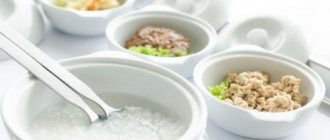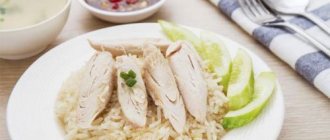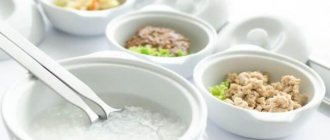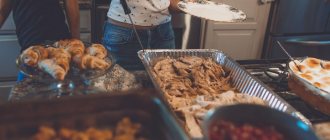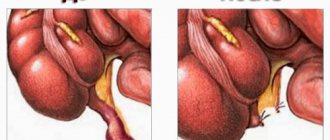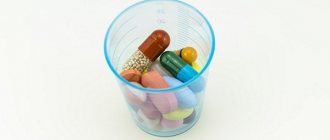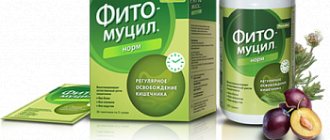Basic nutrition rules
Proper nutrition will help tissue heal quickly.
To ensure the fastest possible healing of tissues, it is necessary to adhere to certain rules:
- The first day after surgery, eating food is strictly prohibited.
- The patient is advised to adhere to a strict diet for three weeks.
- Doctors do not allow you to eat fatty, spicy and fried foods, as well as smoked foods.
- Food should be prepared by boiling, stewing, or baking. You can also steam food.
- Eating rough food is strictly prohibited. That is why it is pre-crushed.
- The patient's diet must necessarily consist of fermented milk products.
- Doctors do not allow the consumption of sweets during the postoperative period.
- The patient must also avoid alcoholic and carbonated drinks.
- Sour fruits and berries are prohibited for the patient after surgery.
- In order to stimulate the intestines, you need to drink coffee. But, the patient is recommended to consult a doctor first.
- Meals should be taken at the same time, which will promote complete intestinal motility.
- Avoid eating foods that cause bloating. This is why patients need to give up nuts, citrus fruits, tomatoes, mushrooms, etc.
- Meals should be fractional. The patient should eat often, but at the same time he should be given minimal portions of food.
If a person adheres to all of the above rules, this will have a positive impact on the success of the recovery period.
Manifestation of pathology
In medicine, the clinical picture of the disease is divided into three stages, each of which will be characterized by certain symptoms.
First stage
It lasts 12 hours and is characterized by pain. If intestinal obstruction is caused by mechanical blockage of the intestine, then the pain will be paroxysmal, with periodic disappearance. Often, when visiting a doctor at this stage, an incomplete blockage is diagnosed - in this case, the patient will be prescribed a diet for partial intestinal obstruction.
In the event of the formation of volvulus, loops and other changes, the pain can be very severe. It rarely disappears and in some cases its intensity provokes loss of consciousness and painful shock.
At the first stage of the disease, nausea and vomiting are extremely rare, only in the case of blockage of the small intestine by some object.
Many patients at the first stage of pathology progression take painkillers and antispasmodics, thus trying to normalize their well-being. Unfortunately, this measure does not bring relief, and the symptoms of adhesive intestinal obstruction, on the contrary, become more intense.
Second phase
It accounts for the period from 12 to 24 hours from the onset of manifestations of intestinal obstruction. The patient experiences severe pain attacks, and the intestines cease to perform their functions. The result is bloating, incessant vomiting and rapidly increasing dehydration. Seeking medical help at this stage is already considered late, since complications can almost never be avoided. However, the chances of recovery and restoration of functionality are quite good.
Third stage
The most severe and complex, the patient has:
- tachycardia and increased respiratory rate;
- complete absence of urine;
- hyperthermia (increased body temperature).
When examining such a patient, doctors may note the presence of signs of peritonitis and sepsis, the absence of stool and gases.
The third stage of intestinal obstruction is always difficult and rapid. Often, a patient’s toxin poisoning quickly increases, sepsis progresses, which leads to disruption of the functioning of all organs and systems of the body. The result of such a severe course of pathology is the same in almost every case - death.
Permitted and prohibited products
With proper nutrition, intestinal functions are normalized.
In order to correctly create a menu, you need to know about permitted and prohibited products.
The diet should be aimed at alleviating the patient’s condition, since after surgery he often suffers from bloating and pain in the abdomen.
The diet after intestinal surgery should be designed in such a way that the patient’s stool returns to normal.
When choosing food products, you need to ensure that they have a moderate chemical, mechanical and thermal effect on the digestive tract. By consuming the right foods, intestinal functions are normalized and the possibility of postoperative complications is reduced.
During the postoperative period, patients are allowed to eat rice, oatmeal and buckwheat porridge. The patient's menu may consist of low-fat cheese and low-fat cottage cheese. It is mandatory to take flax seeds.
Low mineralized water is recommended for patients. Patients are recommended to consume blueberries, bran, vegetables and fruits, as well as vegetable juices. When consuming certain foods, you need to know that they must be properly cooked. Otherwise, they can harm the intestines.
Benefits of treatment at GMS Hospital
GMS Hospital is a multidisciplinary medical center. Every year more and more patients trust us with their health and there are reasons for this:
- Our clinic has the opportunity to carry out the necessary diagnostic tests as soon as possible and, if the diagnosis is confirmed, to carry out immediate treatment. It is for the convenience of our clients that the emergency surgery department operates around the clock.
- Doctors at GMS Hospital are specialists with many years of experience who are proficient in modern operational techniques for performing emergency operations.
- An integrated approach to patient treatment - consultation and supervision of specialists in related specialties at all stages of your stay in the clinic.
- Modern treatment, advanced technologies, high-class medical equipment to minimize the risk of postoperative complications.
- The interest of medical personnel in the speedy recovery of the patient.
Diet stages
After surgery, you need to eat little and often.
The recovery period after surgery on the intestines consists of going through several stages.
This will allow you to fully restore the functionality of the digestive system. Depending on the stage of recovery, products and methods of their preparation are selected.
In the first few days after surgery, the patient is recommended to eat 8 times a day. One meal should be no more than 300 grams.
The patient is allowed to consume only liquid and jelly-like foods. The temperature of food eaten should be no more than 45 degrees. The amount of salt taken is limited to one gram per day.
If the patient has normal food tolerance at the first stage and the condition returns to normal, then he is transferred to a different diet. At the second stage of the recovery period, the patient is allowed to eat 6 times a day.
Why does intestinal obstruction develop?
The essence of the pathological condition under consideration is the existing obstacles to the passage of the food bolus through the intestines. The reasons may be the following factors:
- ingress of foreign elements, accumulation of worms, hematoma;
- compression of the intestinal lumen by tumors (benign or malignant) located externally or internally;
- accumulation of gallstones in the intestinal lumen;
- volvulus;
- adhesive disease or overgrown scars;
- paralysis of the intestinal muscles.
The causes of intestinal obstruction in a child are similar, but most often there is an accumulation of feces and the presence of a foreign object.
Fully or partially limited products
- Products that enhance putrefactive and fermentation processes: legumes, rye bread, coarse vegetables, baked goods made from wholemeal flour, whole milk, fresh yeast bread, baked goods, kvass, white cabbage. Also excluded from the diet are soups made from legumes, cabbage soup, borscht, rassolnik (due to the presence of pickles and pearl barley), cold first courses (okroshka, beetroot soup) and cold drinks that stimulate intestinal motility.
- Strong and fatty broths.
- Beets, radishes, celery, onions, radishes, garlic, mushrooms, rutabaga, turnips, cucumbers, sorrel, spinach.
- Milk in its natural form, sharp and overly salty cheeses.
- Fatty meats/fish/poultry, canned meat and fish, lard, smoked meats.
- Any fats (including vegetable fats), except butter.
- Millet, pearl barley, corn, barley cereals.
- Grapes, apricots, plums, dried fruits.
- Hot sauces, mustard, mayonnaise, horseradish, all types of pepper.
- It is not allowed to consume ice cream, chocolate, cakes, pastries, carbonated drinks, kvass, fruit drinks and juices from plums, grapes and apricots.
Table of prohibited products
| Proteins, g | Fats, g | Carbohydrates, g | Calories, kcal | |
Vegetables and greens | ||||
| vegetables legumes | 9,1 | 1,6 | 27,0 | 168 |
| swede | 1,2 | 0,1 | 7,7 | 37 |
| cabbage | 1,8 | 0,1 | 4,7 | 27 |
| cucumbers | 0,8 | 0,1 | 2,8 | 15 |
| parsnip | 1,4 | 0,5 | 9,2 | 47 |
| parsley (root) | 1,5 | 0,6 | 10,1 | 49 |
| radish | 1,2 | 0,1 | 3,4 | 19 |
| white radish | 1,4 | 0,0 | 4,1 | 21 |
| turnip | 1,5 | 0,1 | 6,2 | 30 |
| beet | 1,5 | 0,1 | 8,8 | 40 |
| celery | 0,9 | 0,1 | 2,1 | 12 |
| horseradish | 3,2 | 0,4 | 10,5 | 56 |
| garlic | 6,5 | 0,5 | 29,9 | 143 |
| spinach | 2,9 | 0,3 | 2,0 | 22 |
| sorrel | 1,5 | 0,3 | 2,9 | 19 |
Fruits | ||||
| bananas | 1,5 | 0,2 | 21,8 | 95 |
| melon | 0,6 | 0,3 | 7,4 | 33 |
Berries | ||||
| grape | 0,6 | 0,2 | 16,8 | 65 |
Mushrooms | ||||
| mushrooms | 3,5 | 2,0 | 2,5 | 30 |
Nuts and dried fruits | ||||
| dried fruits | 2,3 | 0,6 | 68,2 | 286 |
Cereals and porridges | ||||
| pearl barley | 9,3 | 1,1 | 73,7 | 320 |
| Wheat groats | 11,5 | 1,3 | 62,0 | 316 |
| millet cereal | 11,5 | 3,3 | 69,3 | 348 |
| barley grits | 10,4 | 1,3 | 66,3 | 324 |
Flour and pasta | ||||
| pasta | 10,4 | 1,1 | 69,7 | 337 |
Bakery products | ||||
| vysivkovy bread | 9,0 | 2,2 | 36,0 | 217 |
| Old Russian grain bread | 9,6 | 2,7 | 47,1 | 252 |
| Rye bread | 6,6 | 1,2 | 34,2 | 165 |
Confectionery | ||||
| candies | 4,3 | 19,8 | 67,5 | 453 |
| cookie | 7,5 | 11,8 | 74,9 | 417 |
| Kurabye cookies | 6,7 | 25,8 | 64,6 | 516 |
| butter cookies | 10,4 | 5,2 | 76,8 | 458 |
Ice cream | ||||
| ice cream | 3,7 | 6,9 | 22,1 | 189 |
Cakes | ||||
| cake | 4,4 | 23,4 | 45,2 | 407 |
Raw materials and seasonings | ||||
| seasonings | 7,0 | 1,9 | 26,0 | 149 |
| mustard | 5,7 | 6,4 | 22,0 | 162 |
Meat products | ||||
| pork | 16,0 | 21,6 | 0,0 | 259 |
Sausages | ||||
| dry-cured sausage | 24,1 | 38,3 | 1,0 | 455 |
Bird | ||||
| duck | 16,5 | 61,2 | 0,0 | 346 |
| goose | 16,1 | 33,3 | 0,0 | 364 |
Fish and seafood | ||||
| dried fish | 17,5 | 4,6 | 0,0 | 139 |
| smoked fish | 26,8 | 9,9 | 0,0 | 196 |
| canned fish | 17,5 | 2,0 | 0,0 | 88 |
Oils and fats | ||||
| vegetable oil | 0,0 | 99,0 | 0,0 | 899 |
| animal fat | 0,0 | 99,7 | 0,0 | 897 |
| cooking fat | 0,0 | 99,7 | 0,0 | 897 |
Non-alcoholic drinks | ||||
| bread kvass | 0,2 | 0,0 | 5,2 | 27 |
Juices and compotes | ||||
| apricot juice | 0,9 | 0,1 | 9,0 | 38 |
| grape juice | 0,3 | 0,0 | 14,0 | 54 |
| plum juice | 0,8 | 0,0 | 9,6 | 39 |
| * data is per 100 g of product | ||||
Nutrition in the third week after surgery
The surgeon assigns table No. 1b. It is a transition to a physiologically complete diet No. 1, lasts a week. The protein content in the diet increases to 100 g, carbohydrates already amount to 400 g. The energy intensity of the daily diet increases to 3000 kcal. The total volume of food is brought to 2.5–3 kg.
The nature of the diet changes: vegetable purees, meatballs, and steamed cutlets are added to liquid dishes. Semi-liquid buckwheat, oatmeal and rice porridges are prepared, sugar and butter are added to them (in a plate). A little honey is allowed in tea or with rosehip decoction. Pasta and legumes are not recommended.
Features of nutrition at the end of the month
By the end of the recovery period, the patient is prescribed diet No. 1. It allows for significant expansion compared to previous versions. The total food mass reaches 3–3.5 kg, calorie content 3000–3200 kcal.
The requirements for a gentle diet (mashed dishes) continue, but porridge with diluted milk (millet is excluded), kefir are introduced, chopped meat, casseroles, small vermicelli or noodles, and omelettes are allowed. You can eat pureed vegetables to a limited extent. Berry and fruit jelly are allowed.
The composition of the menu corresponds to the physiological daily norm: protein increases to 100 g, fats can be 100–110 g, carbohydrates 400–450 g. The patient is allowed:
What can you eat if you have appendicitis?
- dried wheat bread, crackers, biscuits;
- cereal soups with non-rich meat broth;
- boiled dishes from lean meat and fish, soufflés, cutlets, meatballs;
- vegetable puree from carrots, potatoes, cauliflower, pumpkin, zucchini;
- non-acidic berries and fruits in compote, boiled in porridge, baked;
- a little honey, jam.
How long the patient will be on diet No. 1 depends on the individual characteristics of the disease and immunity. Most often it takes 2–3 weeks.
